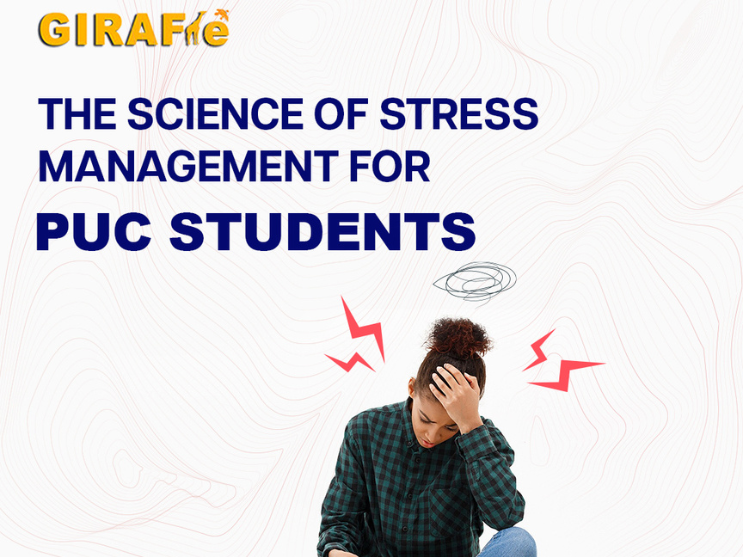How to Prepare for JEE Mains - 7 Essential Tips For Every Student
- Updated on :
- Giraffe Learning
- Comment
JEE mains have become a benchmark for testing the best of the best in India. It has received worldwide recognition for its ingenuity and intellectual questions.
Even today, almost every student and their parents have considered attempting JEE mains and securing the best grades; so they can join one of the prestigious IITs, IIITs, or NITs.
However, the path to this success has been very difficult and only a few were able to make it through in the past.
But today it is a different story.
With multiple highly qualified professors, teachers, and academicians now willing to go beyond their boundaries to help students; the chances of cracking one of India’s toughest exams is no longer a far-fetched dream but a staunch reality.
Giraffe, unlike many coaching institutes out there, concentrates on bringing these expert advisors to your everyday training to bring the best out of you.
And in this article, we share some of the tips and tricks that have helped our students achieve the best results and become part of the IIT club.
So, first, let’s start with the basics.
What is JEE Main?
Shortened for Joint Entrance Examination, JEE Main is the first part of the two JEE exams. (The other being JEE Advanced).
It is annually conducted by the National Testing Agency (NTA) and it helps institutions & students in going through the right admission procedure.
JEE Mains is further divided into Paper 1 and Paper 2. Paper 1 is for admissions into engineering and technology courses. Whereas Paper 2 is to get into B.Planning and B.Arch courses.
The best part about JEE main is that it has a fixed exam structure and it does not change every year. That’s why most students find JEE main an easier option and quickest way to get into STEM fields rather than choosing the full spectrum of JEE.
Since the hit in 2020, there’s been a change in the structure. Currently, this is what is being implemented.
Why is the JEE Exam important?
If you want to get into engineering, architecture, planning or any of the in-demand fields then you need to successfully clear JEE exams.
As you may already know, fields like AI, ML, Blockchain, Quantum computing and many other revolutionary technologies have already started taking their place in human society as inevitables.
More and more manual jobs are getting automated and so to get the best of jobs (and the best of annual packages) you have to clear the JEE exam and get into the engineering & technology institutions.
Why is JEE Mains Coaching Important?
It is very hard to prepare for JEE mains all alone. Many times you need expert guidance.
That’s why Giraffe is here to help you. We want you to become a topper with the best JEE coaching with Giraffe Learning!
We bring in the best expert to teach you, guide you, and get you the best scores that you never thought possible.
We’ve been doing this for over a decade now and most of our students are now working in huge corporations across the world after graduating from IITs, NITs, and IIITs.
You can join them too as we bring in some of these stalwart alumni to give you some tips and tricks.
In the meanwhile, here are some common tips and tricks we follow that help our students get skyrocketing marks.
Top 7 JEE Mains Tips & Tricks
Now let’s look at the 10 JEE Main Tips & Tricks
1. Do not pick anything new!
Let's get one thing straight. Tension remains at the highest peak when you're dealing with JEE mains. Especially days before the examination.
There are so many subjects to prepare for and deal with so many opinions (from every corner of your life).
So, there's no doubt that you are rollercoasting on high-stress levels.
And one common mistake that most students make, in order to cope with this pressure, is to pick something totally new.
This could be a course or a subject they are not familiar with or some unknown (unintelligible) advice given by a family member.
Now that is something you should avoid at all costs.
Because doing that will lead you to confusion and chaos, which often renders your existing knowledge too to zero.
So, stick to what you already know and make it your strongest forte.
Revise, polish and build on the knowledge you already possess.
This will provide better options to clear the test than running around in never-ending circles.
2. Study the Subjects Where Most Questions are Repeating
Your next question will be what to study?
One of the things we do here at Giraffe is to analyze multiple papers from the previous years to understand which subjects, topics, and questions are being repeated.
Once we have analyzed these questions, we emphasize the subjects from which the most questions come in.
By doing so, our students know which questions to really concentrate on and which questions to pay less attention to.
That’s why we have students who scored 99% in their JEE mains.
You should follow the same process.
If you have a tough time, do reach out to us and we can help you.
3. Do not give in to Peer pressure
For many students, this passing phase of entrance exams after their 12th happens to be a nerve-racking experience.
And the primary reason for that is the unsurmountable peer pressure they face.
But it does not have to be that way.
We recommend that you tear and burn all the negativity you face and stay confident. Or else you will not lose time but you may end up being depressed.
Constantly churn on positive thoughts and influence your mind with best people so you can stay focused.
Also, surround yourself with the right people so you will not become a victim of peer pressure.
4. Analyze any of your past attempts
Now, this is only applicable if you have already tried your hand at JEE at least once.
Reflect on all the preparation, the exam, the answers, and the various things that you may (or may not) have done wrong.
This will give you a good stepping stone on where to start and what to avoid.
You may also look at getting rid of procrastination, not missing out on important subjects, and stopping committing silly errors, which may have cost you your opportunity the last time.
So do not repeat the same mistakes and stay vigilant!
5. Revise and Analyze
In the most realistic circumstances, you may have only 2 months before the eventual exam.
So the first thing you need to do is revise every subject that you have learnt. The purpose is to help retain all concepts and clear misconceptions.
Doing so will make your knowledge robust and increase your confidence multi-fold.
Now it’s time to put this knowledge to the test. That’s where your analysis comes in.
Attempt as many as previous year papers in stringent time limits to understand how you’d fare in real test conditions.
This enables you to do a self-check on where you may falter and where you will stay strong.
You can always work on those weaker sections just a little bit but strengthen your stronger sections through constant redoing.
Trust us when we say this, you will be so happy, relieved, and confident when you reach the end of this process.
And you’ll be all set to get going.
6. Study with High Frequency
The last few weeks before the exam are crucial so you cannot be lethargic.
You have to become the best version of yourself. And this happens only if you study with high frequency.
Now it does not mean you should become a caved animal. It just means you have to spend enough time getting things done for the exam.
It also means that you have to prepare for the exam like it is tomorrow.
While a lot of people deny it, a good physical workout every day will actually boost your confidence levels, release enough dopamine & happy hormones, and push your brain to work faster.
So do get that essential workout every day.
7. Get the right help
Now it is not uncommon to reach a point during your preparation where you’d need some help.
When you do reach that point, get appropriate help from certified experts rather than random people.
You may also choose the best books for preparation.
Only by doing so can you ensure you stay on the right track and not get lost.
You may consider Giraffe if you’d like where we offer personalized assistance to our students and give them the best training.
And That’s how to prepare for JEE mains!
Follow these 7 tips to the dot and you will certainly ace your JEE Mains.
Do not give in to any naysayers. Just believe in yourself and you can achieve it.
We’re always here to help you out.
FAQs
How many marks are required to clear JEE mains?
So the passing mark for JEE mains is 89 if you belong to the general section. If you belong to the SC section then the passing mark is 54. And for the OBC section, the passing mark is 74.
How to crack JEE mains?
By revising thoroughly, answering previous year question papers and getting the right help when you need it. You can follow the 7 tips mentioned in this article to get a better grip of yourself and confidently answer your questions.
You may also choose to get expert advice from our renowned coaches.
How many attempts in JEE mains?
From the time you clear your class 12th, you get three consecutive attempts to appear for the exam. And there is no age limit. But you don’t have to worry about the number of attempts because if you get the right coaching you can clear it in one attempt.
When will JEE mains 2022 be held?
The JEE main 2022 exams are expected to be conducted by NTA in four sessions - March, April, May, and June. The application date for the January session has already been completed.
How many papers are there in JEE mains?
There are two papers in JEE mains. Paper 1 is for BE and Btech. Paper 2 is for B.Arch and B.planning. Paper 1 has three subjects Physics, Chemistry and Mathematics. Paper 2 has Mathematics, General Aptitude, and Drawing Skills/Planning.
Does JEE Main have negative marking?
Yes, you get -1 for every incorrect answer. However, if you do not answer a question, there is no negative marking. Also, there is no negative marking for numerical value-based questions.
How much time is required to prepare for JEE mains?
It varies from person to person. Some candidates take 2 years to prepare for the exam, while some students only need 6 months to crack the papers with the highest marks. It depends on how much time you need to complete all the subjects in the course, the syllabus, and how soon you can put the knowledge into action. The best way to score the best marks is to start at least a year before the exam date and get really strong on all your fundamentals.
Who are eligible for JEE mains?
Any student who has successfully passed their 12th can appear for the JEE mains exam.
What is a good rank in JEE mains?
A range of 95-99 is a good score to get into JEE mains. However, some do argue that 99 is the best mark.
Should I drop a year for JEE?
You don’t have to drop a year for JEE. You can start preparing for it as soon as you complete your 10th and get ready for your 11th. The best way to prepare for JEE is to get enough time for preparation, digest all the topics available and be able to prepare for the exam well before the scheduled time. If you do these things as you go through the 11th and 12th, you don’t have to drop a year for the exam.
Can I get admission in engineering without JEE?
You will only get admission to a local engineering college which may not have the best of faculties, facilities and features. Clearing JEE mains gets you into top tier universities and colleges which provides a bright perspective to your future. So it all depends on your choice on whether you want to get into the best college or if you want to get into a mediocre college.
What is the syllabus of JEE mains 2022?
The syllabus of Jee main is vast. You will have various subjects from mathematics, physics, and chemistry in Paper 1. And likewise, related questions in paper 2.
Paper 1 - Mathematics has 16 units. Physics has 20 units in section A and 1 unit in section B. Chemistry has 10 units in section A, 8 units in section B, and 10 units in section C.
Paper 2A - Mathematics has 16 units, Aptitude has 2 units, and drawing has 1 unit.
Paper 2B - Mathematics has 16 units, aptitude 2 units, and planning 3 units.
Is JEE necessary for BTech?
Yes JEE is necessary for BTech because technology is hard and it keeps getting harder. Only those who have the right skills can get into technology. Or else you cannot get into it. That’s why JEE prepares students for all the tougher challenges ahead of them.
Is JEE is compulsory for engineering?
Yes, it is absolutely compulsory to get into engineering. Without JEE it is very difficult to get into engineering.
How many marks are needed to qualify to JEE mains?
You need very good marks of at least 95-99 in JEE. Only then you will qualify or else it becomes very tough to get admission to the best engineering institutions.
How many times JEE is conducted in a year?
It is conducted 5 times a year.



